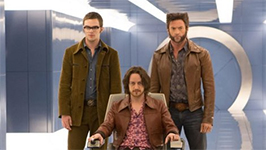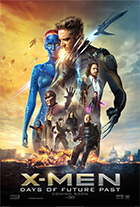X-Men: Days of Future Past
|  Although it arrives amid a glut of increasingly similar-looking and -feeling superhero-franchise movies, I can say this much for X-Men: Days of Future Past: I felt like something was genuinely at stake. At this point, we have seen the world threatened with annihilation by so many devastating forces, most of which manage to destroy at least a sizable portion of New York City or some other major metropolitan area before being subdued by the titular superhero(es), that the prospect of mass destruction has begun to elicit yawns. Uh-oh, the world is in danger … again. Days of Future Past, the seventh entry in the X-Men franchise (including the two Wolverine spin-offs), wisely jumps the gun by beginning with the world having already been decimated. Amid the ruins are a small group of mutants who are on the brink of annihilation. Thus, the story’s stakes are, despite the familiarly bleak post-apocalyptic setting, inherently more personal and intimate, which makes the film as a whole more emotionally gripping. Although it arrives amid a glut of increasingly similar-looking and -feeling superhero-franchise movies, I can say this much for X-Men: Days of Future Past: I felt like something was genuinely at stake. At this point, we have seen the world threatened with annihilation by so many devastating forces, most of which manage to destroy at least a sizable portion of New York City or some other major metropolitan area before being subdued by the titular superhero(es), that the prospect of mass destruction has begun to elicit yawns. Uh-oh, the world is in danger … again. Days of Future Past, the seventh entry in the X-Men franchise (including the two Wolverine spin-offs), wisely jumps the gun by beginning with the world having already been decimated. Amid the ruins are a small group of mutants who are on the brink of annihilation. Thus, the story’s stakes are, despite the familiarly bleak post-apocalyptic setting, inherently more personal and intimate, which makes the film as a whole more emotionally gripping.The story opens 50 years in the future where giant machines called Sentinels have destroyed almost all of the world’s mutant population, as well as any and all humans who dared to help them or might be capable of giving birth to a mutant. There are only a small handful of mutants still surviving, including Professor X (Patrick Stewart), the leader of the X-Men; Magneto (Ian McKellan), his former friend and long-time nemesis; Storm (Halley Berry), who can control weather; and Kitty Pryde (Ellen Page), who can send people’s consciousness back in time into their past bodies. Having nowhere left to run from the Sentinels (they are holed up in a remote monastery in the Himalayas), this rag-tag group of survivors decides that the only way to save themselves is to go back in time and alter the past, particularly a specific event in 1973 in which Mystique (Jennifer Lawrence), Professor X’s shape-shifting adopted sister, assassinated Dr. Bolivar Trask (Peter Dinklage), the anti-mutant scientist responsible for developing the Sentinels. Rather than stopping work on the project, his death only rallied people against mutants and helped bolster support for their destruction. The only person capable of going that far back in time in Wolverine (Hugh Jackman), whose ability to self-heal almost instantly protects him from the ravages of such lengthy time-travel. Thus, Kitty sends his consciousness back to his essentially ageless body in 1973, where he must convince his fellow mutants of the need to stop Mystique’s assassination of Trask. Unfortunately for Wolverine, he finds that 1973 is a particularly bad year for mutantkind. Charles Xavier (James McAvoy), who will become Professor X, has become depressed and disaffected after the majority of the young mutants under his tutelage were recruited into military service for Vietnam. His School for the Gifted, a kind of sanctuary for young mutants, has fallen into disrepair as he spends most of his time in a drunken stupor, his telekinetic abilities purposefully muffled by a drug cocktail created by Hank (Nicholas Hoult), a young man who wishes to control the literal beast within. Meanwhile, Charles’s former best friend Erik Lehnsherr (Michael Fassbender), he who will become Magneto, is imprisoned 10 floors beneath the Pentagon for his role in the JFK assassination. Thus, Wolverine’s only chance to alter the awful future ahead of them involves convincing Charles to shake off the doldrums and help Erik escape imprisonment, which is achieved with the help of the aptly named Quicksilver (played as a devious teenager by Evan Peters) in a fantastically hilarious ultra-slow-motion sequence set to the strains of Jim Croce’s “Time in a Bottle.” X-Men: Days of Future Past marks the return of director Bryan Singer, who helmed the original X-Men (2000) and X2 (2003), which are largely responsible for kicking off the modern superhero genre. The screenplay is also the product of franchise veterans: It was penned by Simon Kinberg, who wrote X-Men: The Last Stand (2006), from a story he concocted with Jane Goldman and Matthew Vaughn, both of whom worked on the 2011 reboot X-Men: First Class, which introduced the younger cast (the storyline is actually borrowed from a popular two-issue story arc from the comic book series The Uncanny X-Men). Days of Future Past is clearly designed as a transition film, temporarily bringing together the old in moving the franchise away from the original films starring Patrick Stewart and Ian McKellan and fully establishing the new cast headed by James McAvoy and Michael Fassbender, much like J.J. Abrams’ rebooted Star Trek series has done by including Leonard Nimoy. In this regard, it works very well, with the presence of Stewart and McKellan giving the future sequences added dramatic weight, as the demise of such iconic characters looms large. Singer has fun with the early 1970s setting of the past sequences, giving plenty of Nixon-era rock hits a spin while ol’ Tricky Dick himself (played by Mark Camacho) has a meaty role as a supporter of Trask’s Sentinel program. The costume design, interiors, and cars are marked and flashy, but it’s impressive how quickly the story takes over and keeps the visuals from becoming sticky kitsch. Kinberg’s screenplay focuses a great deal on the various interpersonal relationships, including the series-defining feud between Charles and Erik over how mutants should deal with humankind’s fear of them (Charles believes in peaceful solutions while Erik can only see war) and Mystique’s wavering middle ground between them. The series has long worked as an allegory for all sorts of social and political issues, many of which are quite prominently interwoven into the narrative, but never with a heavy hand. The mere presence of the Vietnam war is more than enough to remind us of humanity’s violent follies, while the backroom international political machinations that result in the Sentinel program’s being green-lit feel painfully familiar. The film climaxes, not surprisingly, with a big action sequence set in front of the White House, but unlike so many other superhero films, the destruction is relatively limited and the emphasis is placed on a single decision of whether or not to pull a trigger. That, in and of itself, is some kind of progress. Copyright ©2014 James Kendrick Thoughts? E-mail James Kendrick All images copyright © 20th Century Fox / Marvel Studios |
Overall Rating: 

 (3)
(3)


